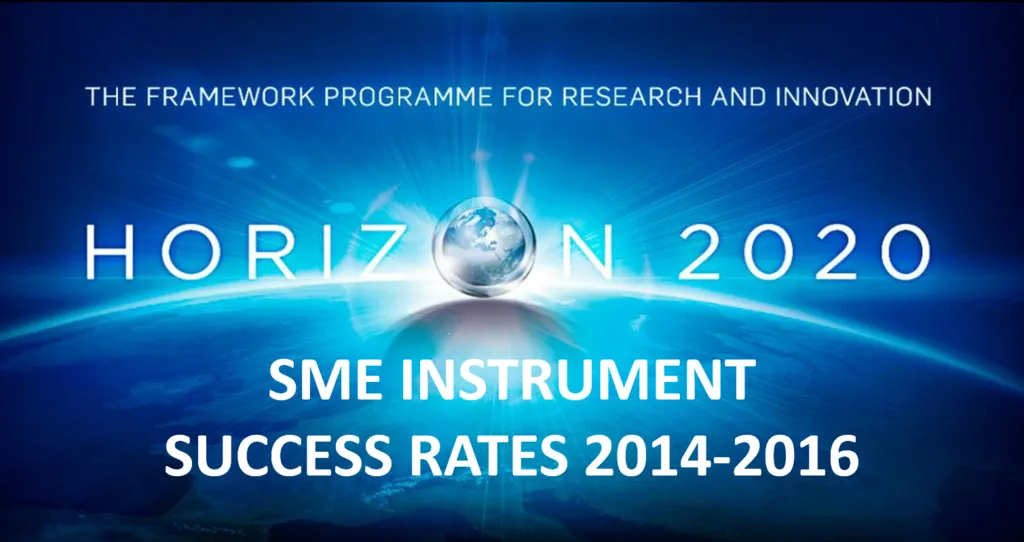
Published at Friday, May 5, 2017 11:52 AM on the Zaz Ventures organization's page
What are your real odds in the Horizon 2020 SME Instrument?
An excellent funding programme that has become very popular with SMEs.
The SME instrument aims to fill funding gaps for innovative companies that are 1-2 years away from commercialising a new product/service. Unlike other European funding schemes, an individual SME can apply for up to €2.5M and does not need to assemble a consortium. The process is streamlined, with a funding decision given within 2 months of submission and 4 recurring submission cut-offs per year.
The SME instrument programme has become a victim of its popularity: average success rates for phase 2 dropped significantly between 2014 (~11%) and 2015 (~4%) and this trend continued in 2016, despite larger budgets being allocated to the programme.
If we exclude the February 2016 cut-off (where no resubmissions were possible as the results from the previous cut-off came late), the average success rate for 2016 was ~3% across all topics. However, it is important to understand that many proposals are written by dedicated proposal writers and resubmitted several times. Therefore, the odds of success for a primo-applicant developing a proposal without external help is even lower than 3%.
Our consultancy has developed over 100 SME instrument applications (phase 1 and phase 2) since the programme started. We have demonstrated repeatable success in the most selective part of the programme (phase 2) with 21 successful phase 2 projects totalling over €40M (of which 10 projects granted in 2016).
As a result, we now rank number 2 in Europe in terms of successful phase 2 projects.
Here is what we learned from our successful proposals.
A stringent qualification process is a must!
We take less than 20% of the projects that are presented to us. We have to turn down many projects that, despite being technically excellent and innovative, do not demonstrate sufficient market maturity and/or alignment with EC strategic roadmaps. Since we only work on success fees, we have to give the entrepreneur true feedback on their chances, and we will not engage in an assignment where we are not fully convinced we can succeed in phase 1 and phase 2.
Our advice: make sure you fulfil all criteria and ask for independent third-party feedback about your real chances before you start investing time and/or money
Should you start with phase 1 or phase 2?
Statistically, companies that have gone through phase 1 first have a 2-3x higher chance of success in phase 2. However, entrepreneurs who already understand well their market and have a solid business-plan may take the risk to apply directly at phase 2, as they have already gathered all the phase 1 data they need to build a convincing application. Beware of consultancies that boast many successes in phase 1 (where success rates are currently around 9%, i.e. 3x higher than in phase 2) but almost none in phase 2 (the selective part of the programme). Getting a €50k grant is not your primary goal here. Beware also of consultancies that boast many "seals of excellence" (which are given to companies who scored above 13 in phase 1 and 12 in phase 2, but could not get funded).
Our advice: get honest advice from third parties about which phase you should apply to and beware of consultancies that have a disproportionate number of successes in phase 1 vs phase 2
There is no shortcut to excellence...
The level of competition is extraordinarily high, and entrepreneurs must be prepared for the fact that their proposal will not get funded if it scores anywhere below 14 (out of 15). This requires an outstanding application without any weakness. Our proposal writing process typically takes 3 months, and there is no shortcut: building an excellent proposal takes time, regardless of the quality of the input provided by the entrepreneurs.
Our advice: plan your proposal writing resources (internal or external) at least 3 months before the deadline
Persistence is key... until a certain point
Over 80% of our proposals score above 13 (out of 15) but many of them do not get funded (as the EC budget is not sufficient to fund all excellent proposals). We sometimes resubmit proposals several times before getting them funded. But this is only valid for excellent proposals. Resubmitting an average proposal (i.e. scoring between 11 and 13) with incremental improvements is doomed to fail. Another risk is that after 2 or 3 submissions, evaluators get a déjà-vu feeling and give you a score similar to the previous iteration (it is not a given that the same evaluators read your proposal, but chances increase statistically with each resubmission).
Our advice: do not resubmit over and over again a “good” proposal as only truly excellent proposals will be successful, but instead, explore other funding schemes with higher success rates (e.g. EUREKA Eurostars, national funding, etc. )
ABOUT THE AUTHORS
Zaz Ventures provides innovation funding services (EC funding proposal writing) across a variety of domains (ICT, Security, Transportation, Space, Energy, Environment, Manufacturing, Health, Agri-Food).
The majority of our projects are carried out on a no-win-no-pay basis. This means that we only invoice our services when (and if) the client receives public funding. This formula is particularly attractive for very competitive schemes where the average success rate is below 5%, such as the H2020 SME instrument.
Zaz Ventures has raised over €100M of funding for its customers since the beginning of the Horizon 2020 programme. See our success stories at https://storify.com/H2020experts
Follow us on Twitter: @h2020experts or visit: www.zazventures.com